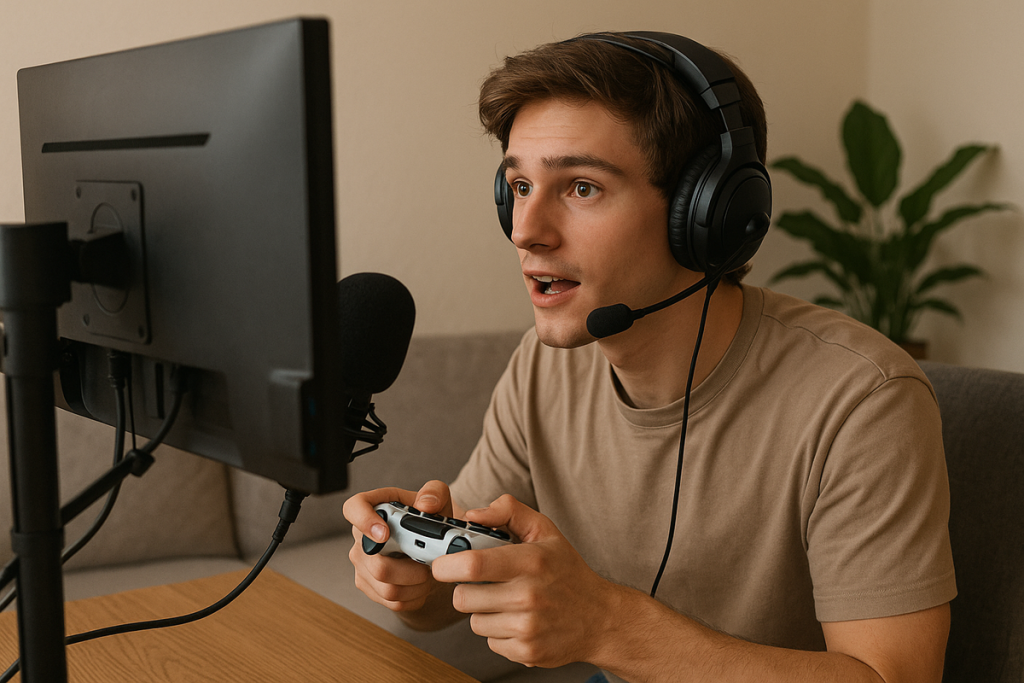Remember when gaming content was just walkthroughs and cheat codes on IGN? Now we’ve got streamers pulling in millions of viewers, YouTubers breaking games before developers even patch them, and content creators essentially becoming the face of entire gaming franchises. The relationship between games and the people who create content around them has fundamentally changed how we play, buy, and think about video games.
From Players To Influencers: The New Gaming Ecosystem
Ten years ago, if you wanted to know if a game was worth buying, you’d check Metacritic or read a professional review. Now? You’re probably watching your favorite streamer play it for three hours, or checking out a YouTube breakdown from someone who’s already put 50 hours into it.
Content creators have become more influential than traditional gaming journalism in many ways. When a major streamer like Shroud or Pokimane picks up a game, it can mean millions in free advertising for developers. When they criticize something, it can tank a game’s reputation overnight.
This shift has created an entire economy around gaming content. We’re not just talking about Twitch partnerships anymore, we’re talking about full-scale media empires built on gaming personalities.
The Professionalization of Gaming Content
What’s interesting is how professional this space has become. The days of just hitting “Go Live” and hoping for viewers are pretty much over if you want to make real money. Successful gaming creators now operate like legitimate media businesses.
They have upload schedules, content calendars, sponsor relationships, merchandise lines, and business managers. Some of the top creators have teams: editors, thumbnail designers, social media managers, even agents who negotiate their brand deals.
This professionalization means treating content creation like an actual career. Having professional assets like a digital media kit isn’t just for lifestyle influencers anymore, gaming creators need to present themselves as legitimate partners when working with game publishers, peripheral brands, and energy drink companies that dominate gaming sponsorships.
When Creators Become Part of the Game
Here’s where it gets really meta: game developers are now building content creators directly into their marketing strategies and sometimes even into the games themselves.
Fall Guys had creator codes. Fortnite gives streamers custom islands and creative tools. Among Us exploded purely because of creator-driven content. Valorant was literally designed with Twitch in mind, Riot gave early access to streamers, knowing the hype would build organically.
Some games even feature creator likenesses or references. Apex Legends has worked with major streamers on in-game events. Call of Duty has operator skins based on popular content creators. The line between player and marketer has completely blurred.
The Dark Side: When Content Ruins Games
But this creator-centric ecosystem isn’t all positive. There’s a growing tension between what makes good content and what makes good gameplay.
Developers sometimes balance games around what will be exciting to watch rather than what’s fun to play. Battle royales became oversaturated partly because they’re great streaming content, even though the market was clearly oversaturated.
Then there’s the drama. When a major creator criticizes a game, their audience piles on, sometimes legitimately, sometimes in toxic ways. Developers have had to deal with harassment campaigns started by creators who didn’t like a patch or a ban.
And let’s not ignore the exploitation. Some creators promote gambling mechanics, sketchy betting sites, or engage in pay-to-win schemes that hurt younger audiences who trust them.
What Actually Makes Gaming Content Work
So what separates the successful gaming creators from the thousands who never break through? It’s not just skill at the game, though that helps.
Personality matters more than gameplay. People watch Markiplier’s horror game reactions for Mark, not the games. They watch CallMeCarson for the chaos, not necessarily peak gaming performance.
Consistency is everything. The algorithm rewards regular uploads and streaming schedules. You can’t just go viral once and coast.
Niche specialization vs. variety. There’s this constant debate: do you become “the Valorant guy” or do you play everything? Both can work, but you need a strategy. When you browse media kit examples of successful gaming creators, you’ll see different approaches to building a brand.
Community engagement. The best gaming creators build actual communities, not just audiences. Discord servers, subscriber games, inside jokes: that parasocial relationship is the product.
The Future: Where Gaming Content Goes Next
VR streaming is still clunky but getting better. Cloud gaming could democratize content creation: no need for expensive rigs. AI might help with editing and highlight reels, letting creators focus more on personality and less on production.
But the biggest shift might be decentralization. We’re already seeing creators move away from relying solely on YouTube or Twitch. They’re building personal brands across multiple platforms, selling direct memberships, creating their own games or products.
The creator who can own their audience, not just borrow it from a platform, will be the one who survives long-term.
Why This Matters Beyond Gaming
The gaming creator economy is basically a preview of where all entertainment is headed. Traditional media is dying. Audiences want authenticity, interactivity, and parasocial connection with the people they watch.
Movies and TV are already feeling this shift. Star Wars theory channels get more engagement than official Star Wars press. Marvel casting announcements break on Twitter before traditional outlets cover them. The MCU basically relies on YouTuber breakdowns and Reddit theories to maintain hype between releases.
Comics have been leaning into this too: creators on YouTube and TikTok driving sales of specific issues or runs just by talking about them enthusiastically.
Gaming just got there first because the medium was already interactive and digital. But the model (independent creators building audiences around existing IP and creating their own media empires) is the future of entertainment consumption.
The Bottom Line
Gaming content creation has evolved from a hobby into a legitimate industry. The most successful creators treat it like a business, present themselves professionally, and understand they’re not just players, they’re media personalities, influencers, and sometimes even game developers themselves.
Whether you love it or hate it, this is the new reality. Creators have power. Audiences trust them more than brands. And the games industry has adapted to make creators central to how games are marketed, played, and experienced.
For anyone trying to break into this space, the barrier to entry is low but the barrier to success is high. You need more than gaming skills. You need personality, business sense, consistency, and yeah, you need to present yourself like a professional if you want brands and developers to take you seriously.
The golden age of “just streaming for fun” is over. Now it’s an industry. And like any industry, the people who treat it seriously are the ones who win.






